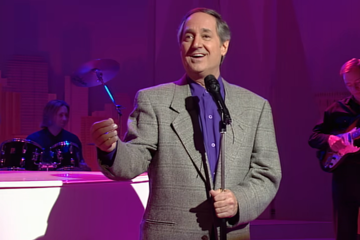For what seems like decades, the Buena Vista Social Club has been one of Cuba’s most prominent mainstream cultural exports.
The musical collective has included greats of Cuban music like Compay Segundo, Ruben González, and Ibrahim Ferrer, and has become a banner under which various related projects, albums, and tours have been created. It famously rejuvenated traditional Cuban ‘son’ music with the eponymous 1997 album, reaching out to the world and pulling in a Grammy. Now, in a time of massive change for the country as the US begins relaxing its longstanding embargo on trade, the BVSC is pulling up stumps.
True to form, the Orquesta Buena Vista Social Club are going out with a massive international Adios tour. Bandleader and trombonist, Jesus ‘Aguaje’ Ramos, says it’s the end of one very beautiful thing. “I think nobody related to the project knew about the great success it was going to be. For us it was, and I can say still is nowadays, a great honour to be part [of it] and to bring our culture and musical tradition around the world.”
"We are sad to say goodbye but very happy to do it the best way we can."
The collective could perhaps be regarded as coming about via the combination of the curatorial skills of Juan de Marcos González and US guitarist Ry Cooder, and the passion of its founding players, many of whom started out when the actual Buena Vista Social Club still stood as a meeting place for musicians in Havana in the 1940s.
Its rapturous popularity since 1997 could perhaps be explained by this very real connection between Cuba’s present and its past. That that past is also regarded as a pre-revolutionary ‘golden age’ can only be an enhancement of this link. “Our music has a lot of influences and roots, maybe that’s why it’s so well received,” Ramos says. Wim Wenders’ Oscar-nominated documentary also clearly did lots to transmit the group’s message. “Being part of the Buena Vista gave us the opportunity to collaborate with a great number of artists along the years. I can only thank being a part of it.” Indeed, these musicians added to the group’s influences; people like Beny Moré, Ruben González, and, later, Gorillaz.
Don't miss a beat with our FREE daily newsletter
With their history of offshoots and collaborations, it’s no wonder the future won’t be one of long, retiring afternoons for Ramos and the Orquesta’s other members. “Each one of us have our own projects and we are hopeful we will have the chance to share them,” he says.
In each answer Ramos provides, two things are patently clear: his deferral of attention on himself to gratitude for the experience, and his joy in involving others. “Things are changing for us and it is very important that we represent our tradition and culture. We try to be as faithful as possible to the Cuban sound and our roots.”
But first, there’s a party required: “It’s like a bittersweet feeling. We are sad to say goodbye but very happy to do it the best way we can. With our best energy, music, and best vibe!”















